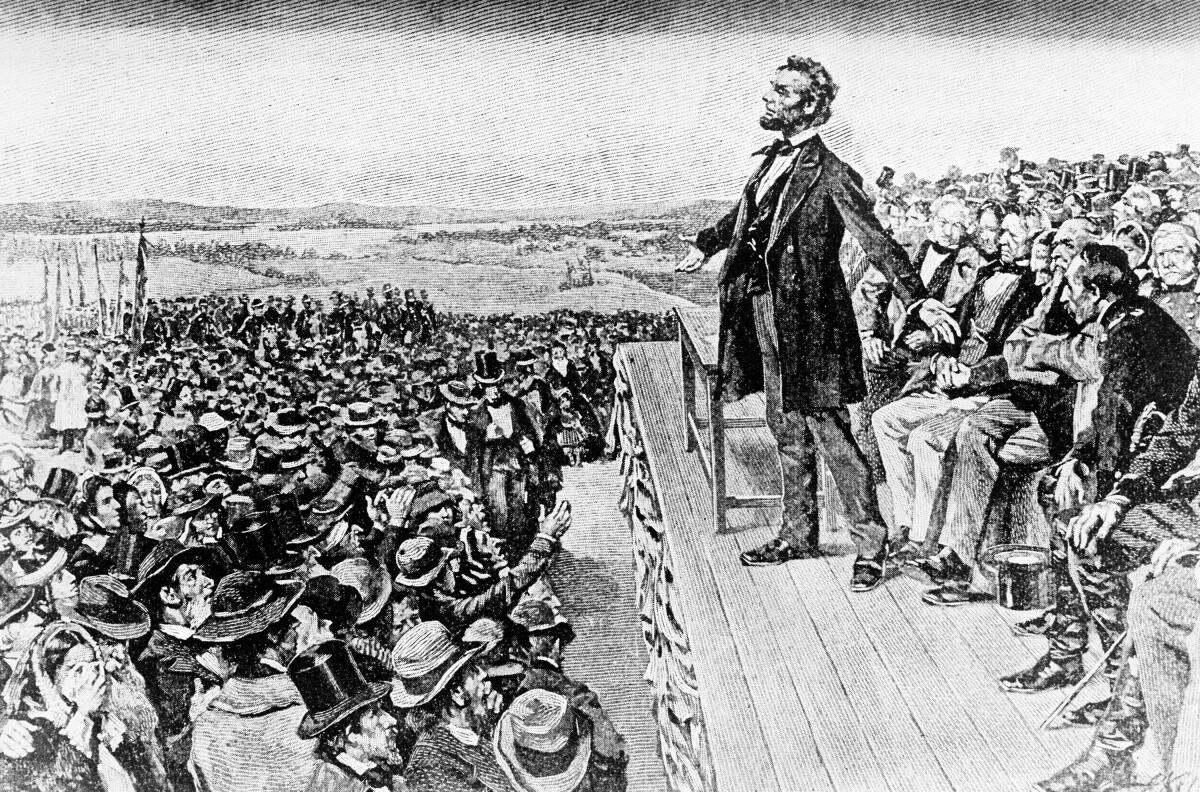Opinion: Gettysburg is sacred ground. Don’t defile it with a partisan political event

As a child in Queens, N.Y., I loved to sing the anthems my elementary school taught us, especially “My Country ’Tis of Thee.” My parents had emigrated to the United States from Hong Kong only a few years before I was born, so it might have been a little odd that I proudly sang, “Land where my fathers died / Land of the pilgrims’ pride / From ev’ry mountainside / Let freedom ring!”
Full-throated patriotism is not always popular these days, and yet it is incumbent on us — in the face of hourly outrages by one of the most authoritarian-leaning presidents in this nation’s history — to lean on the vocabulary of civic good that was instilled in us as children.
The latest outrage is that President Trump is considering accepting the Republican Party’s nomination for reelection from the “great battlefield” at Gettysburg.
Gettysburg, the site of one of the most cataclysmic confrontations in our nation’s history, could not be a more inappropriate venue for a Republican National Convention event — or a more inappropriate campaign backdrop for either of the major political parties.
And it is particularly troubling that Trump might co-opt this place of secular pilgrimage for his political ends.
It was President Lincoln, our first Republican president, who consecrated this space, creating meaning out of the three-day spasm of violence that claimed well over 3,000 soldiers’ lives in July 1863. Had Confederate Gen. George Pickett’s charge succeeded, sedition and slavery would have triumphed, and our experiment in democratic self-government might very well have ended.
Four and half months after the great battle, Lincoln’s visit to Gettysburg helped establish a moral narrative around the great conflict, explaining the Civil War not as some abstract struggle over states’ rights but as “a new birth of freedom,” an existential struggle for the very survival of this nation and its ideals.
It is shocking by today’s standards that one of history’s finest orations was delivered over just two or three minutes — following a two-hour speech by Gov. Edward Everett of Massachusetts — and ended so memorably: “We here highly resolve that these dead shall not have died in vain — that this nation, under God, shall have a new birth of freedom — and that government of the people, by the people, for the people, shall not perish from the earth.”
In his 1865 second inaugural address, Lincoln would define the struggle against slavery in nearly apocalyptic terms, quoting the Psalms to invoke God’s awful justice. As at Gettysburg, the nation needed a way to make sense of the war’s staggering slaughter, and Lincoln helped to provide it.
For Trump to travel to Gettysburg this month for a partisan event would be an even greater disgrace than his divisive July 4 appearance at Mt. Rushmore, where he sought to stoke the nation’s raw political divisions rather than assuage them.
It is far too late to expect Trump to summon up even a modicum of decency, but when it comes to his party’s nomination, he should accept it from one of his many residences, such as Trump Tower (where he announced his bid for the presidency, in 2015); his Bedminster, N.J., golf course; or his Mar-a-Lago estate in Florida. He should leave Gettysburg alone, and allow the thousands of men who perished there to continue to repose in peace. Honoring the fathers and mothers who defended this Union at its moment of greatest peril, and struggled so that two and a half centuries of bondage should end, demands that we keep this ground sacred.
More to Read
A cure for the common opinion
Get thought-provoking perspectives with our weekly newsletter.
You may occasionally receive promotional content from the Los Angeles Times.











